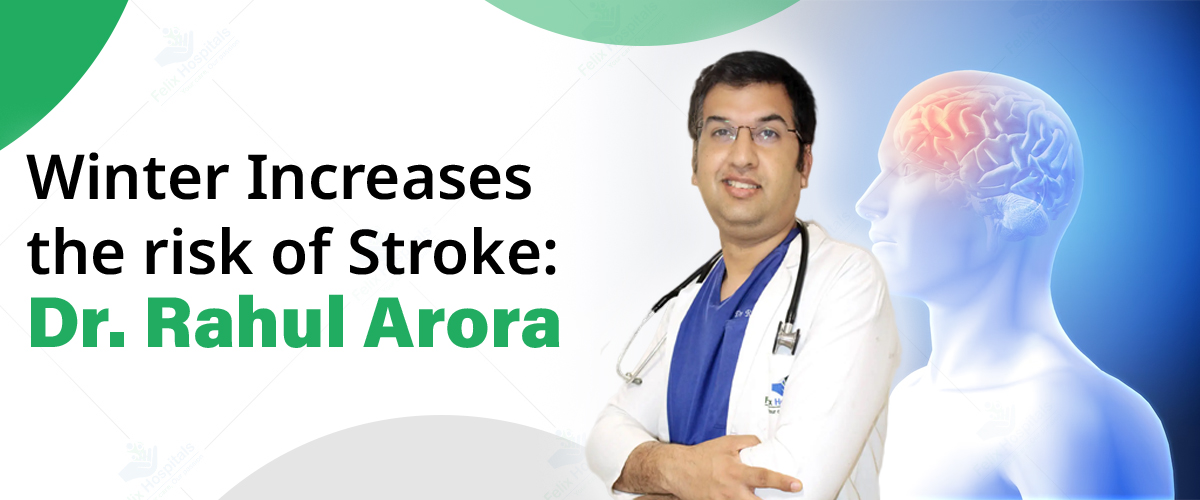
Subscribe to our

As winter arrives, many enjoy cozy nights and festive celebrations, but the colder months also bring specific health challenges, particularly for cardiovascular health. Dr. Rahul Arora, a leading cardiologist at Felix Hospital, explains that winter can increase the risk of heart attacks, strokes, and other cardiovascular events. This blog will explore why cardiovascular risk rises in colder weather, the warning signs to watch for, and preventive measures to safeguard your heart.
If you have concerns about your heart health or stroke risk, schedule a consultation with our expert cardiologists at Felix Hospital today. Call now at +91 9667064100.
Before discussing seasonal impacts, it’s essential to understand cardiovascular events:
Heart Attack (Myocardial Infarction): This occurs when blood flow to the heart is blocked, often due to a blood clot.
Stroke: This occurs when blood flow to the brain is interrupted, either from a blood clot (ischemic) or a ruptured vessel (hemorrhagic).
Heart Failure: The heart becomes too weak to pump blood effectively, leading to fatigue, swelling, and other symptoms.
Cardiovascular disease remains the leading cause of death globally.
In India, a significant percentage of heart attacks and strokes occur during the winter.
Cold Weather and Blood Pressure Cold temperatures cause blood vessels to constrict, which raises blood pressure—a major risk factor for heart attacks and strokes. Increased blood pressure adds strain on the heart and arteries, elevating cardiovascular risk.
Sedentary Lifestyle Winter often means less physical activity as people stay indoors, contributing to weight gain, high cholesterol, and elevated blood pressure—all of which increase the risk of cardiovascular disease.
Dietary Changes Many people indulge in comfort foods during winter, which are often high in salt, sugar, and unhealthy fats. These dietary changes can lead to high blood pressure and elevated cholesterol, compounding cardiovascular risks.
Increased Risk of Illness Winter is flu season, and studies show that infections can trigger cardiovascular events, particularly in older adults. The body’s inflammatory response to illness can stress the heart and increase clot risk.
Emotional Stress and Isolation Seasonal mood changes and holiday stress can negatively affect heart health, leading to increased blood pressure and strain on the cardiovascular system.
Recognizing symptoms of heart attacks and strokes is crucial for timely intervention:
Chest pain or discomfort, shortness of breath, sweating, and pain radiating to the arm, neck, or jaw.
Face Drooping: Does one side of the face droop?
Arm Weakness: Is one arm weak or numb?
Speech Difficulty: Is speech slurred or incoherent?
Time to Call: Immediate help is essential for stroke treatment.
If you or someone experiences these symptoms, seek emergency care immediately.
Check blood pressure regularly, especially if you have hypertension. Keeping blood pressure within a safe range significantly reduces cardiovascular risk.
Incorporate indoor exercises or join a gym to maintain cardiovascular health. Regular activity, even in winter, can help reduce blood pressure, cholesterol, and body weight.
Focus on a balanced diet rich in fruits, vegetables, whole grains, and lean proteins. Limit salt, sugar, and unhealthy fats to reduce cholesterol and blood pressure.
Protect yourself against flu and other infections to reduce the strain of illness on the heart. This is particularly important for older adults and those with pre-existing conditions.
Reduce stress with activities like meditation, yoga, or breathing exercises. Staying socially connected and engaging in enjoyable activities can also support heart health.
Avoid cold exposure by keeping your environment warm. Cold temperatures can raise blood pressure, increasing strain on the heart.
Felix Hospital is fully equipped to address all cardiovascular concerns, offering comprehensive care for heart attack and stroke treatment, as well as long-term heart health management.
Immediate Care Patients experiencing cardiovascular events receive rapid evaluation and treatment, as every moment counts in minimizing damage.
Advanced Diagnostics Our cardiology team uses the latest diagnostic tools, such as ECGs, echocardiograms, CT scans, and MRIs, to assess heart health and diagnose any underlying conditions.
Rehabilitation and Long-Term Care After stabilization, patients may benefit from cardiac rehabilitation, tailored to each person’s recovery needs to support long-term heart health.
Maintain your heart health during the winter months and learn more by Clicking Here about our specialized cardiovascular services at Felix Hospital.
As the temperature drops, awareness of increased cardiovascular risk is essential. By taking preventive measures, monitoring for warning signs, and maintaining a heart-healthy lifestyle, individuals can reduce their risk and enjoy better heart health through the winter months. If you’re concerned about your cardiovascular health, Felix Hospital offers expert care and support for all your cardiology needs.
1-Why does winter increase cardiovascular risk?
ANS: Cold weather raises blood pressure, combined with factors like a sedentary lifestyle, high-salt diets, and flu season, which all elevate cardiovascular risk.
2- What are the early signs of cardiovascular issues?
ANS: Symptoms include chest pain, arm or jaw pain, shortness of breath, and stroke symptoms like face drooping and speech difficulty.
3- How can I protect my heart in winter?
ANS: Regular exercise, a balanced diet, stress management, and blood pressure monitoring help reduce cardiovascular risk.
4- Can flu increase cardiovascular risk?
ANS: Yes, flu and infections can trigger heart attacks and strokes, particularly in older adults.
5- What cardiology services are available at Felix Hospital?
ANS: Felix Hospital provides immediate care, diagnostic tests, and rehabilitation services for cardiovascular health.
6-Are cardiovascular issues preventable?
ANS: Many risk factors can be managed with lifestyle changes and regular check-ups.
7-What lifestyle changes improve heart health in winter?
ANS: Physical activity, heart-healthy diet, and stress management can improve heart health during colder months.
9-Who should I consult for heart health concerns?
ANS: It’s best to consult a cardiologist for a personalized assessment and guidance based on your health needs.